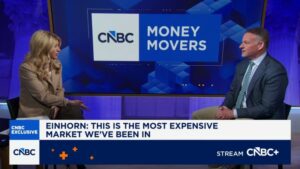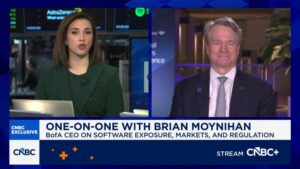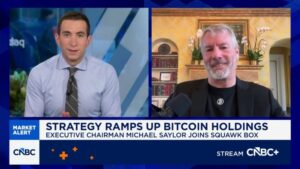As I’ve remarked before, I bought my first shares aged 19, on arrival at university.
Back then — and we’re talking almost fifty years ago — it was a very different world. Real-time trading, it very definitely wasn’t: I placed my buying order at my local bank, with the only clue as to the current share price being that morning’s newspaper. A week or so later, the share certificate turned up.
Today, it’s all very, very different. Real-time share prices, online buying platforms, huge amounts of online information — much of it free, with ISA and SIPP accounts to make shareholding tax-efficient, and most things paperless.
Yet despite all this, the process of buying and holding shares remains opaque to many people — even in the case of people who actually hold a few shares, in my experience.
One Killer Stock For The Cybersecurity Surge
Cybersecurity is surging, with experts predicting that the cybersecurity market will reach US$366 billion by 2028 — more than double what it is today!
And with that kind of growth, this North American company stands to be the biggest winner.
Because their patented “self-repairing” technology is changing the cybersecurity landscape as we know it…
We think it has the potential to become the next famous tech success story. In fact, we think it could become as big… or even BIGGER than Shopify.
Click here to see how you can uncover the name of this North American stock that’s taking over Silicon Valley, one device at a time…
We’ve never had it so good
In a way, though, this isn’t surprising.
For decades, buying shares was something that very few ‘ordinary’ people actually did. I was fortunate enough to come from a family where share ownership was a more familiar concept.
You had to have a stockbroker, for instance — although, for most people, their High Street bank would also have executed the trades. Unfortunately, lots of people didn’t know that.
It wasn’t cheap, either. My father’s stockbroker, for instance, charged £31 commission when my father bought £1000 worth of Marks & Spencer shares in the early 1990s. I shudder to think what that would be in today’s money. What I do know is that commissions these days are around a tenner — or even less at the cheaper, no-frills end of the market.
And — even today — the process of buying, selling, and owning shares has something of its own language. Those new to it all can easily find it all a bit off-putting.
A barrier to wealth-building
There’s a downside to all this — especially the language aspect of it all, and the still-prevalent sense that it’s somehow unusual for ‘ordinary’ people to own shares.
And the downside is this: as a result, people don’t engage with the notion of share ownership, and feel awkward about asking questions about it.
Consequently, you might be surprised — very surprised — to learn how large are the gaps in some people’s understanding. And it’s equally unsurprising that those gaps certainly won’t be helping to build a sense of comfort regarding the idea of building wealth through share ownership.
So here we go: ten things that my experience suggests that lots of people don’t know — and I promise you, I’ve come across plenty of real-life examples of people not understanding these things. Often quite recent examples, too.
I’m asking for a friend, you understand…
- When you buy shares, they aren’t ‘created’ especially for you. When you buy shares, you’re buying shares that other investors have sold. For every trade, there’s a buyer, and a seller.
- Dividends aren’t like interest: they aren’t defined as some percentage of the share price. Instead, they’re a proportion of the company’s profits, with the exact proportion being decided by the company’s board of directors.
- ‘Yield’ is simply a company’s dividend (in pence), over its share price (also in pence). So if a company’s share price halves, its yield doubles. The reverse is true, too.
- The London Stock Exchange isn’t some government institution — it’s just another company, owned by investors like you.
- Some companies are listed on the Stock Exchange twice, under two separate ‘tickers’. Royal Dutch Shell, for example, has a sterling-denominated listing (RDSB), and a euro-denominated one (RDSA). Make sure that you buy the right one: the tax treatments are very different.
- Shares held in a ISA or SIPP are held free from income tax and capital gains tax. When the new social care levy bites, they’ll be free from that, too.
- The FTSE 100 is the Stock Exchange’s largest one hundred companies. The FTSE 250 is the next 250 companies. That’s why you’ll hear talk of the FTSE 350.
- Investment Trusts are companies that invest in other listed companies. Investing in them is therefore a great way to quickly build a diversified portfolio.
- REITs (Real Estate Investment Trusts) do the same thing, but with property: offices, shops, student accommodation, warehouses, retail parks, and so on. They also possess some handy tax advantages.
- A company’s price-earnings ratio (often written as ‘P/E’ ratio) is a useful rough-and-ready measure of how expensive (or cheap) a share is. Especially for income investors, a handy search stratagem is to look for shares with a lower-than-average P/E ratio, and a higher-than-average yield.
So, I hope you learned something! Well done if you did, but also well done if you didn’t — you’re obviously a reasonably well-versed investor: keep up the good work!
5 Stocks For Trying To Build Wealth After 50
Markets around the world are reeling from the coronavirus pandemic…
And with so many great companies trading at what look to be ‘discount-bin’ prices, now could be the time for savvy investors to snap up some potential bargains.
But whether you’re a newbie investor or a seasoned pro, deciding which stocks to add to your shopping list can be daunting prospect during such unprecedented times.
Fortunately, The Motley Fool is here to help: our UK Chief Investment Officer and his analyst team have short-listed five companies that they believe STILL boast significant long-term growth prospects despite the global lock-down…
You see, here at The Motley Fool we don’t believe “over-trading” is the right path to financial freedom in retirement; instead, we advocate buying and holding (for AT LEAST three to five years) 15 or more quality companies, with shareholder-focused management teams at the helm.
That’s why we’re sharing the names of all five of these companies in a special investing report that you can download today for FREE. If you’re 50 or over, we believe these stocks could be a great fit for any well-diversified portfolio, and that you can consider building a position in all five right away.
Click here to claim your free copy of this special investing report now!
Malcolm holds shares in Marks & Spencer and Royal Dutch Shell. The Motley Fool UK has no position in any of the shares mentioned. Views expressed on the companies mentioned in this article are those of the writer and therefore may differ from the official recommendations we make in our subscription services such as Share Advisor, Hidden Winners and Pro. Here at The Motley Fool we believe that considering a diverse range of insights makes us better investors.
This post was originally published on Motley Fool







